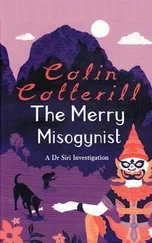Colin Cotterill - The Woman Who Wouldn't die
Здесь есть возможность читать онлайн «Colin Cotterill - The Woman Who Wouldn't die» весь текст электронной книги совершенно бесплатно (целиком полную версию без сокращений). В некоторых случаях можно слушать аудио, скачать через торрент в формате fb2 и присутствует краткое содержание. Жанр: Триллер, на английском языке. Описание произведения, (предисловие) а так же отзывы посетителей доступны на портале библиотеки ЛибКат.
- Название:The Woman Who Wouldn't die
- Автор:
- Жанр:
- Год:неизвестен
- ISBN:нет данных
- Рейтинг книги:3 / 5. Голосов: 1
-
Избранное:Добавить в избранное
- Отзывы:
-
Ваша оценка:
- 60
- 1
- 2
- 3
- 4
- 5
The Woman Who Wouldn't die: краткое содержание, описание и аннотация
Предлагаем к чтению аннотацию, описание, краткое содержание или предисловие (зависит от того, что написал сам автор книги «The Woman Who Wouldn't die»). Если вы не нашли необходимую информацию о книге — напишите в комментариях, мы постараемся отыскать её.
The Woman Who Wouldn't die — читать онлайн бесплатно полную книгу (весь текст) целиком
Ниже представлен текст книги, разбитый по страницам. Система сохранения места последней прочитанной страницы, позволяет с удобством читать онлайн бесплатно книгу «The Woman Who Wouldn't die», без необходимости каждый раз заново искать на чём Вы остановились. Поставьте закладку, и сможете в любой момент перейти на страницу, на которой закончили чтение.
Интервал:
Закладка:
I didn’t know anything about cars. Had never been in one. But I’d seen wheels before. I knew if you gave a handcart a good enough shove you could get it to move. I’d never heard of a handbrake and it wasn’t until several years later when I was learning to drive that it occurred to me that the spirits had left it off especially for me that night on the Mekhong. And even now I wonder whether I imagined what a laugh it would be if the car should roll all the way to the river and Dr Claude emerged angry and wet from the water. Or whether I hoped he’d be lost at the bottom of the Mekhong with all his sins come back in the form of river fish, snapping away at his nasty flesh. Or perhaps I just pushed to see what would happen .
It rolled more easily than I’d imagined. I barely leaned against the black boot and the car was on its way down the slope. It seemed to have a mind all its own. I couldn’t have stopped it if I’d wanted to. I lost sight of Claude’s silhouette when the car reached a sort of shelf and slowed a bit but in seconds it was over the ridge and nose-down headed for the water. The voracious Mekhong took the whole car in one gulp. I hurried to the ledge and looked at the bubbles — big, head-sized globs of air. Every second I expected the evil doctor to burst to the surface, coughing and spluttering and thanking his good Lord for delivering him safely from the edge of death. But he didn’t show. I was surprised to see people running past me, down to the river: foreign men and Lao staff and the Vietnamese and the curious girls. They’d seen it happen. And they all ignored me as if I’d had nothing to do with this. As if a car had taken a fancy for a dip all by itself .
Some men jumped into the water. They were probably drunk and showing off because the water was flowing fast and deep at that time of year. In fact the car was no longer where I’d put it. They found it a week later on the way to Basak. There was no ginger-haired man sitting in the front seat. At first that helped me sleep. Imagining my Dr Claude opening his car door, swimming across the river to live a nice life in Thailand. But that guilt didn’t last for long. One night, Gulap came to me and in perfect Lao she told me how she could rest much more easily knowing that man was where he deserved to be .
On the first day he arrived in Laos, the man calling himself Herve Barnard had travelled south to Pakse on a false laissez-passer. He shook his head at how easy the commies made it to falsify documents. How had they ever won the war? It took him only half a day to find the man he was searching for. The Lao was still living at his old address. This information had recently become available following the declassification of official documents in Paris. Most of the material pertaining to the debacle at Dien Bien Phu was now in the public domain. Too bad for anyone mentioned in the files whose life depended on secrecy.
The Lao officer had once been the head of clandestine missions for the Lao Issara resistance movement and subsequently for the Pathet Lao in the south. The years had made him soft. There had probably been a time when he would have died rather than disclose information about his colleagues. But just two hours of torture, not even sophisticated state-of-the-art torture at that, and Barnard had the name he’d wanted: Daeng Keopakam. The Lao had died anyway, but bereft of honour. Barnard spat on his corpse.
Armed with the name, some old French charm and a seductive smile, he’d found the warm trail of Madame Daeng. She’d continued her lunchtime noodle restaurant shift deep into the American occupation. Then, for some pathetic, nostalgic reason, she’d taken over that same restaurant at the ferry crossing. How was that for ambition? What a mind to waste.
He thought back to their last night. He’d awoken and she was there beside him. She’d kissed his cheek and said good morning. She was beautiful, there was no doubt. Those deep dark chocolate eyes could take all the air out of a man in one blink. He’d looked around the room with heavy eyes. Everything seemed normal. His uniform on hangers in the doorless closet. His gun on the desk. His briefcase on the chair. Everything was as it should have been. Apart from an odd feeling at the back of his mind.
He’d heard the code name Fleur-de-Lis . It had not come from the French side but from the Lao. It had been given up to interrogators by a captured local spy. But he’d not known the agent’s true identity. Only that the Fleur-de-Lis had been responsible for most of the mayhem experienced by the French administration in the south. But, like Barnard, they’d all assumed the agent was a French official. A double agent. At the very least, a sophisticated Vietnamese educated in France. Espionage was a career for the upper classes, not the coolies or the corvee labourers. Nobody had considered for a second that the bane of all their security troubles could be a native.
And that was why it wasn’t until long after the mess to end all messes, after the humiliation, that the man now calling himself Herve Barnard finally put the pieces together. He was certain who Fleur-de-Lis was. He’d been in love with her which made her betrayal even more biting. Yet only he and she knew what had transpired that long sleepy night. And the years passed and he rose through the ranks and became a man with power. But his successes could never satisfy him because of that dreamless night in a bamboo room in Pakse.
And, as a man in his sixties, he was back. He’d stood at the ferry ramp and looked down at the tattered canopy of the noodle stand that had once belonged to Madame Daeng. It was lunchtime but the stools were unoccupied. The pot-bellied patron sat alone eating an orange, wiping his hands on his greasy undershirt. No finesse, thought Barnard. No class. Typical of these disgusting people.
He was back in Vientiane now. He had her name. They’d told him she’d come here twelve months earlier to establish a business in the capital. But the different departments: business registration, migration, housing, medical — none of them was prepared to give out information about a Lao citizen. Not to him. He was the enemy. The officials were cadres from the north-east who’d spent a lifetime fighting his kind. If they spoke French they didn’t let him know as much. When he’d returned with a translator they’d interrogated the poor woman about her relationship with this old farang . Not even offers of a finder’s fee could squeeze a sac of information from these dry old commies. He’d gone to the markets. There were still some French speakers there. Nobody knew of a Madame Keopakam. But Daeng? My word. There were Daengs aplenty, they told him. Fire a bullet in the air and it would likely land on a Daeng. He’d suggested there would be a reward to anyone who could locate his old friend, Daeng Keopakam, from the south and said his name was Herve and he was staying at the Lane Xang.
And that’s where he sat in his hotel room, waiting, choking in the smog of his chain cigarettes, fuming. The only way he could lighten his mood was by imagining Madame Daeng hanging by the ankles from a beam, and him with a brand new tyre iron.
5
On Friday morning, Siri and Daeng awoke to a completely different Mekhong. Far and near, the villages had washed the three years of grime from their longboats and those with leftover paint that hadn’t hardened in the cans had spruced up the old ladies of the river. By whatever means, they’d dragged them to the water and, with thirty-six hours to go before the races began, old crewmates with rusty joints were relearning the pleasures of rowing.
Before the change of administration the races had been annual. Betting on the results had become endemic. Wealthy landowners brought in athletes to replace the less serious rowers on their local crew in order to safeguard their bets. One by one the locals lost their seats to outsiders and became viewers. But these were socialist days and an edict had been passed around saying that only those born within the sound of an elephant’s trumpet from the village could crew its boat. And on this gloriously sunny but chill morning, the motley crews of out-of-shape villagers puffed steam into the cold air. There was no doubt there were no athletes on display this day. It seemed hardly possible that more incongruous teams would ever be gathered. Different ages, genders, builds, sizes of girth, levels of disability and mental state; all were on display.
Читать дальшеИнтервал:
Закладка:
Похожие книги на «The Woman Who Wouldn't die»
Представляем Вашему вниманию похожие книги на «The Woman Who Wouldn't die» списком для выбора. Мы отобрали схожую по названию и смыслу литературу в надежде предоставить читателям больше вариантов отыскать новые, интересные, ещё непрочитанные произведения.
Обсуждение, отзывы о книге «The Woman Who Wouldn't die» и просто собственные мнения читателей. Оставьте ваши комментарии, напишите, что Вы думаете о произведении, его смысле или главных героях. Укажите что конкретно понравилось, а что нет, и почему Вы так считаете.












